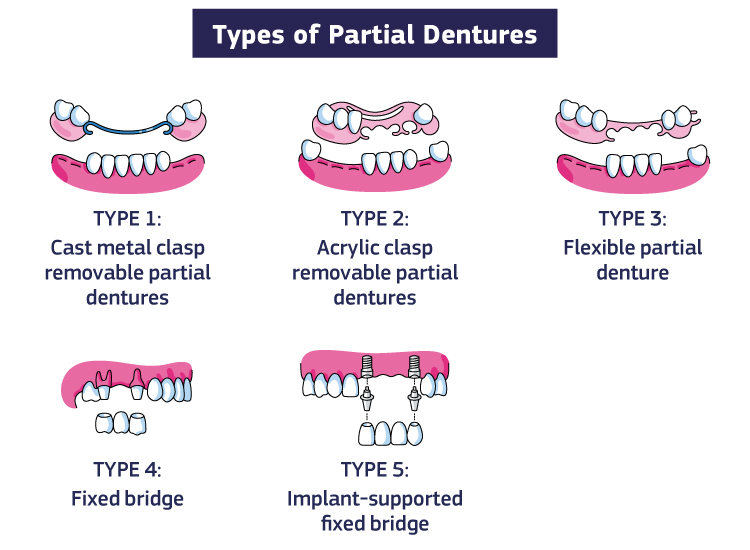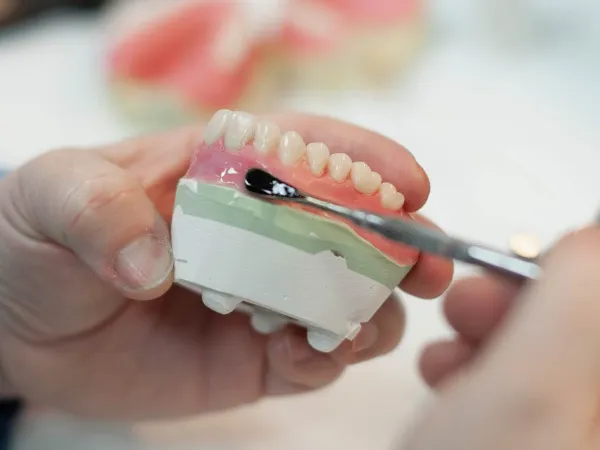Dentures
Custom-Made Dentures for a Perfect Fit
Dentures are removable dental appliances designed to replace missing teeth and restore your smile. They can be made from various materials and come in different types, including normal, flexible, and monoplast dentures.
Dentures not only improve the appearance of your smile but also help with eating and speaking. Our clinic offers custom-made dentures to ensure a comfortable and precise fit.
Types of Dentures
There are several types of dentures available, each designed to meet specific needs and preferences. The main types include normal, flexible, and monoplast dentures.
Normal dentures are typically made from acrylic and are suitable for most patients. Flexible dentures, made from a softer material, provide a more comfortable and natural feel. Monoplast dentures are a type of flexible denture known for their durability and aesthetics.

Frequently Asked Questions
- Improved appearance: Dentures can restore your smile and give you a more youthful look.
- Enhanced oral function: They help you chew food properly and speak more clearly.
- Support for facial muscles: Dentures provide structure to your face, preventing sagging and maintaining your facial shape.
- Customizable options: With different types of dentures available, you can choose the best fit for your needs and preferences.

- Daily cleaning: Brush your dentures daily with a soft-bristle brush and non-abrasive denture cleaner.
- Soaking: Soak your dentures in a denture-cleaning solution overnight to keep them moist and disinfected.
- Handle with care: Be gentle when handling your dentures to avoid dropping or damaging them.
- Regular dental check-ups: Visit your dentist regularly to ensure your dentures fit well and your mouth remains healthy.
- Avoid certain foods: Sticky or hard foods can damage your dentures, so it’s best to avoid them.
- Normal Dentures: Made from acrylic, these dentures are sturdy and effective for most patients. They are typically less expensive but can feel bulkier in the mouth.
- Flexible Dentures: Made from a flexible material, these dentures provide a more comfortable and natural feel. They are less likely to break but may be more expensive than normal dentures.
- Monoplast Dentures: A type of flexible denture known for its durability and aesthetic appeal. Monoplast dentures are highly resilient and provide a seamless fit and natural appearance.
- Normal Dentures: The cost ranges from $300 to $500 per arch.
- Flexible Dentures: The cost ranges from $700 to $1,500 per arch.
- Monoplast Dentures: The cost ranges from $1,200 to $2,500 per arch.
KNOWLEDGE BASE
Know About Dentures
What are dentures?
Dentures are false teeth that are worn to replace missing teeth. If you have missing teeth, wearing dentures can make eating and speaking easier. It can also avoid a loss of confidence in the way you look.
When might you need dentures?
If you have missing teeth, your dentist might speak to you about getting dentures fitted. Dentures are specially made to fit your mouth.
There are 3 main types of dentures:
- A full denture rests on the gum and replaces all the teeth on the upper or lower jaw, or both.
- A partial denture replaces some teeth and is held in place by clasps around the remaining teeth.
- An implant-retained denture replaces one or more teeth and is fitted through implants in the jaw.

What happens during a denture fitting?
If you’re having your teeth removed, you might choose to have dentures inserted on the same day. This is called an immediate denture. You may need frequent adjustments as your gums heal.
The dentist might ask you if you would wait a few months before getting dentures. This allows your gums to heal so you won’t need as much adjustment once the dentures are in place.
What to expect after a denture fitting
Wearing dentures might feel strange at first. Most people take a few months to get used to how they feel. You might need follow-up appointments so the dentist can make adjustments. After you have become used to the dentures, you’ll still need an appointment with your dentist, at least yearly, to check they fit correctly.
You’ll need to learn how to take care of your dentures daily to avoid inflamed gums or infections. The Australian Dental Prosthetist Association recommends you clean your dentures twice a day, and after eating when necessary. Use a soaking solution and only use a specially designed soft denture brush when necessary.
You should also look after your mouth, even if you don’t have teeth. Brush your gums and tongue every day and visit your dentist regularly.
What are the benefits and risks of denture fitting?
Dentures can make eating and speaking easier for most people. If you don’t replace missing teeth, the muscles in the face will sag. Dentures can help fill out a person's face.
Most people take a few months to adjust to wearing a new set of dentures. They may feel awkward or loose at first. You might feel irritation or soreness. You might have more saliva than normal. Make sure you see your dentist if your mouth is sore, or if you have bleeding gums, swelling or ulcers. They may need to adjust your dentures.
Enquire Now
Request An Appointment
Request A Callback
Get right dental care book with your doctor!
Or Connect on Whatsapp
Whatsapp 050 5029261Al Burj Al Thahbi Medical Center

Almollah Building - Room No 105, 106 - Industrial Area 3 - Industrial Area - Sharjah - United Arab Emirates
050 5029261 Google Map
